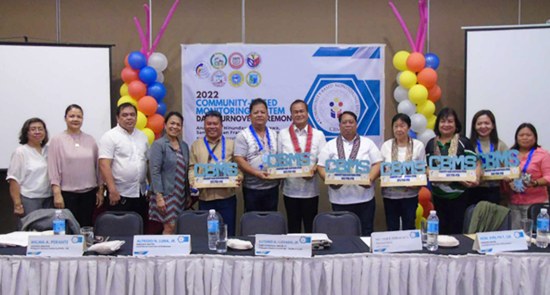PSA turns over 100% of
2022 CBMS PSA-funded to 5th and 6th class municipalities in Southern
Leyte
|

Witnessing
the 2022 CBMS Data Turnover Ceremony (DTC) for Southern
Leyte LGUs were (from left) Zonia Salazar, Mae Almonte,
Eutemio Llevado and Dir. Wilma Perante, all of PSA-RSSO 8,
MPDC Edmar T. Tambis of Tomas Oppus, MPDC Raul B. Fajardo of
San Juan, Mayor Reynaldo Saludo of San Juan, Mayor Melchor
Petracorta of Limasawa, Mayor Evelyn Lee of Hinundayan,
Mayor Benedicta Tiaozon of San Francisco, MPDC Rea Lynd
Andena of Anahawan, and MPDC Ma. Bella Gilbuena of
Hinundayan. |
By
PSA-8
September 30, 2023
MACROHON, Southern
Leyte – The Philippine Statistics Authority -Regional
Statistical Services Office VIII (PSA-RSSO 08) and its Provincial
Statistical Office (PSO) -Southern Leyte, turned over 100 percent of
the 2022 Community-Based Monitoring System (2022 CBMS) results to
the following 5th and 6th class Local Government Units of Southern
Leyte, namely: Anahawan, Hinundayan, San Francisco, San Juan, Tomas
Oppus and Limasawa, during the recently concluded Data Turnover
Ceremony (DTC). This is in addition to the municipalities of Padre
Burgos, San Ricardo, Pintuyan and Libagon who have already received
their PSA-Funded 2022 CBMS data. Meanwhile, PSA also held the DTC
for LGU-Funded 2022 CBMS in St. Bernard town.
PSA RSSO 8 Regional
Director Wilma A. Perante, in her opening message, commended the six
(6) municipalities for their full support in the 2022 CBMS
implementation in their respective municipalities. She mentioned
that the 2022 CBMS answers the desire of LGUs to have barangay level
data as basis in the formulation of their plans and programs. With
2022 CBMS, LGUs will be able to correctly hit the program
beneficiaries in their communities. She also emphasized that the use
of Computer-Aided Personal Interview (CAPI) facilitated the entire
CBMS operation. Director Perante commended the Local Chief
Executives (LCEs) for leading its implementation and thanked the
enumerators, processors, supervisors and barangay officials who all
contributed to the success of the 2022 CBMS.
National Statistician and
Civil Registrar General Claire Dennis S. Mapa, in his recorded
message, cited the LGUs for their full support in the CBMS
implementation. He also emphasized the relevance of CBMS results in
their program formulation, particularly those that were geared
toward alleviating poverty situation. He encouraged the local
officials to turn data into meaningful action and make CBMS an
integral part of their governance framework.
Provincial Director Danilo
A. Laguitan of the Department of the Interior and Local Government (DILG)
said that all development efforts of the government are geared
towards reducing poverty. However, this cannot be done without the
correct baseline data and disaggregated information for diagnosing
poverty at the local level. CBMS is the long-awaited government
effort of generating data up to barangay level for an
evidenced-based program planning.
Provincial Director Rey
Noel R. Collera of the Department of Information and Communications
Technology (DICT) reaffirmed in his recorded message his commitment
in the CBMS implementation. He emphasized that with the shared
vision of becoming a data driven community, the voice of the
constituents will be amplified and be given appropriate action. Data
from CBMS will serve as catalyst of change if the responsibility and
challenges of CBMS are embraced by the community and its officials.
PSA RSSO 8 Chief
Statistical Specialist Mae R. Almonte and Supervising Statistical
Specialist Zonia C. Salazar presented the 2022 CBMS highlights of
the Municipalities of Anahawan, Hinundayan, San Francisco, San Juan,
Limasawa and Tomas Oppus on the following: basic services such as
access to electricity, internet, main sources of water, service
level of toilet facility, households’ perception on safety when
walking alone in the community, household food insecurity experience
in the past 12 months socio-demographic characteristics, education,
reasons for not continuing school, education facilities, labor force
and employment, barangay health facilities, housing units
characteristics and disaster preparedness.
Symbolically the following
LGU officials accepted the CBMS data and expressed their gratitude
and appreciation to PSA: Hinundayan Mayor Evelyn T. Lee, San Juan
Mayor Reynaldo Saludo, San Francisco Mayor Benedicta Tiaozon,
Limasawa Mayor Melchor Petracorta, Anahawan Mayor represented by
Municipal Planning and Development Coordinator (MPDC) Realyn Andena,
and Tomas Oppus MPDC Edmar Tambis. They also committed to utilize
the 2022 CBMS results for the betterment of the lives of their
constituents.
Ms. Binky D. Vasquez,
Provincial Planning and Development Coordinator (PPDC) of Southern
Leyte, thanked PSA and everyone who form part of the success of CBMS.
The MPDCs of the 6 LGUs discussed the different uses of CBMS data in
their respective municipalities. They also committed to ensure
compliance to the requirements of data privacy as managers of their
CBMS data.
In closing, CSS Eutemio
Llevado, Jr. of PSO Southern Leyte thanked everyone for the support
which contributed to the success of CBMS implementation in the
province. Supervising Statistical Specialist Elissa P. Carbonilla
described the LGU’s CBMS journey as smooth and successful even
though there were bumps along the way. The success was made possible
because of the strong support and cooperation of all the local
officials of the municipality.
CBMS is an organized
technology-based system of collecting, processing and validating
necessary disaggregated data that may be used for local planning,
program implementation, and impact monitoring while empowering
communities to participate the process. It involves the generation
of data at the local level, which serves as basis in targeting
households for government programs geared towards poverty
alleviation and economic development.